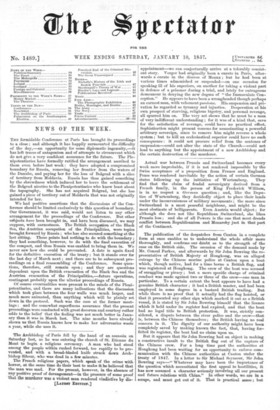NEWS OF THE WEEK.
TEE formidable Conference at Paris has brought its proceedings to a close ; and although it has happily surmounted the difficulty of the day,—an opportunity for some diplomatic ingenuity,—it has left traces of antagonism and of attempts to circumvent which do not give a very confident assurance for the future. The Plenipotentiaries have formally ratified the arrangement ascribed to them even before last week: they have adopted a compromised boundary for Russia, removing her frontier from the waters of the Danube, and paying her for the loss of Bolgrad with a slice of territory from Moldavia. Russia has thus gained something by the shrewdness which induced her to leave the settlement of the Bolgrad niceties to the Plenipotentiaries who knew least about the topography. She has not acquired Bolgrad, but she has gained a piece of territory out of Moldavia that was not originally intended for her.
We had positive assertions that the discussions of the Conference should be limited exclusively to this question of boundary. Our Government, it was said, would not listen to any other arrangement for the proceedings of the Conference. But other subjects have been brought in, and have been discussed, we may suppose, with earnestness. The British occuRation of the Black Sea, the Austrian occupation of the Principalities, were topics brought forward by Russia ; who has also secured something at the last sitting. Those points had nothing to do with the boundary ; they had something, however, to do with the final execution of the compact, and thus Russia was enabled to bring them in. We never saw how she could be prevented. A date is again fixed for the definitive execution of the treaty ; but it stands over for the last day of March next ; and there are to be subsequent proceedings on a final reassembling of the Conference. Some questions, therefore, still remain open ; and they are questions dependent upon the British evacuation of the Black Sea and the Austrian evacuation of the Principalities,—future operations, contingent probably upon the ulterior proceedings of Russia.
Of course eventualities were present to the minds of the Plenipotentiaries, and there are many indications that the discussion which took place between the four walls was much larger, and much more animated, than anything which will be plainly set down in the protocol. Such was the case at the former meetlags; and the somewhat superfluous assurance that the present proceedings were conducted with great decorum and courtesy rather adds to the belief that the feeling was not much better in January than it was in March last. The nine months have already shown us that Russia knows how to make her adversaries waste a year, while she uses it.




























 Previous page
Previous page